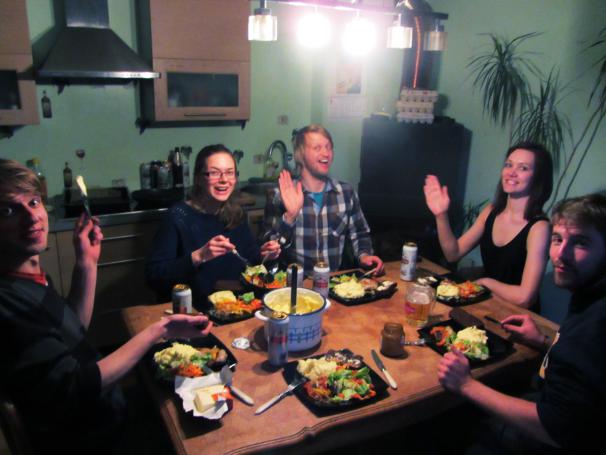
Estonian friends who hosted me before I returned the favor months later
on January 9, 2014
Couchsurfing is a two-way street. It works because for each surfer out traveling the world, there is a host willing to open their home to a stranger. It seems like a give and take system, but once you've hosted some really great surfers you'll find that hosting can be just as rewarding as surfing.
Personally, I've been limited in my ability to host surfers due to a semi-nomadic lifestyle. But in the experiences I've had, I can say that hosting can be very rewarding. Ultimately, you get to be at home with your everyday comforts and friends, and the fascinating people from across the world come to you. You get to share everything you love about your community with people who are out in the world to experience new things.
If you’re unsure about hosting, you might start by simply meeting with surfers in your area for a drink or to show them your favorite spots in town. You don’t have to open your home right away. You can offer to give people a tour, or find them at a group meetup before extending an offer to host. Understand that there is some work involved with hosting. You’re signing on to make sure that the needs of your guests are generally met.
When you’ve decided to host and you start receiving couch requests, it’s important to read profiles and exchange messages. Get to know your potential surfers. Try to understand how you’ll connect with them and make sure it will be beneficial for both parties before you accept. The last thing you want is someone in your home who you’re having trouble connecting and getting along with. Do whatever you need to feel comfortable before opening your home to surfers.
Being a good host means being someone that guests can connect with. It’s nice to give someone a free place to stay, but if that’s the only reason you’re hosting you should say so. If a surfer has chosen to request your couch, they probably hope you’ll spend some time getting to know and learning from each other. Again, it takes experiencing things together to form a good connection. You might think about how some of the hosts you’ve stayed with interacted with you, and how well you were able to connect as a result.
It’s important to keep safety in mind, even as the host. If there are things you want your guests to know about you or your place, make sure they do. Spend time getting to know who you’re hosting before trust them with your place and your things. Don’t leave out valuables that could be misplaced or broken and cause unnecessary conflict. If you feel unsafe or insecure at anytime, make it known. Remember that it’s much safer and more enjoyable to have friends around when you’re hosting. They can help keep the conversation flowing and connect with your guests as well. Who knows, they might make friends with someone that they will visit someday, someplace in the world.

